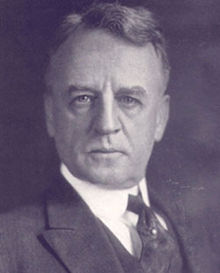Dwight Whitney Morrow
| Dwight Morrow | |
|---|---|
 |
|
|
United States Senator from New Jersey |
|
|
In office December 3, 1930 – October 5, 1931 |
|
| Preceded by | David Baird, Jr. |
| Succeeded by | William W. Barbour |
| United States Ambassador to Mexico | |
|
In office October 29, 1927 – September 17, 1930 |
|
| President |
Calvin Coolidge Herbert Hoover |
| Preceded by | James R. Sheffield |
| Succeeded by | J. Reuben Clark |
| Personal details | |
| Born |
Dwight Whitney Morrow January 11, 1873 Huntington, West Virginia |
| Died | October 5, 1931 (aged 58) Englewood, New Jersey |
| Political party | Republican |
| Residence | North Haven, Maine (seasonal) |
| Religion | Presbyterian |
| Military service | |
| Battles/wars | World War I |
Dwight Whitney Morrow (January 11, 1873 – October 5, 1931) was an American businessman, diplomat, and politician of Scots-Irish descent, best known as the U.S. ambassador who improved U.S.-Mexican relations, mediating the religious conflict in Mexico known as the Cristero rebellion (1926–29), but also contributing to an easing of conflict between the two countries over oil. The Morrow Mission to Mexico was an "important step in the 'retreat from imperialism'". He was the father-in-law of Charles A. Lindbergh.
Born in Huntington, West Virginia, he moved with his parents, James E. and Clara Morrow to Allegheny, Pennsylvania in 1875. His father James was principal of Marshall College, which is now Marshall University. Morrow's great-great-grandfather Alexander Morrow had immigrated to America from Ireland around the year 1803. Before this, Alexander's ancestors had come from Scotland. After graduating from Amherst College in 1895, Morrow studied law at Columbia Law School and began practicing at the law firm Simpson Thacher & Bartlett in New York City. In 1903, he married Elizabeth Reeve Cutter, his college sweetheart, with whom he would have four children. Anne Morrow, his daughter, would later marry Charles A. Lindbergh, whom she met while her father was Ambassador to Mexico. In 1913, he became a partner at J.P. Morgan & Co., one of the largest, most powerful commercial and investment banks in the United States during this era, financially backing industrial giants such as General Motors and 3M. As a partner at Morgan, he served as a director on many corporate and financial boards.
With the onset of World War I in Europe, the bank lent Britain and France large sums of money, and purchased war materials in the U.S. with it. When the United States joined the War, he became the director of the National War Savings Committee for the State of New Jersey; served abroad as adviser to the Allied Maritime Transport Council, as a member of the Military Board of Allied Supply and as a civilian aide. With his proven logistical and intellectual talents, he was moved to France and made chief civilian aide to Gen. John J. Pershing.
...
Wikipedia
